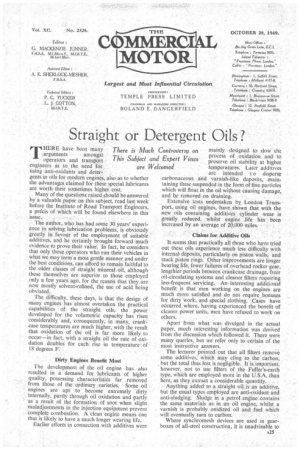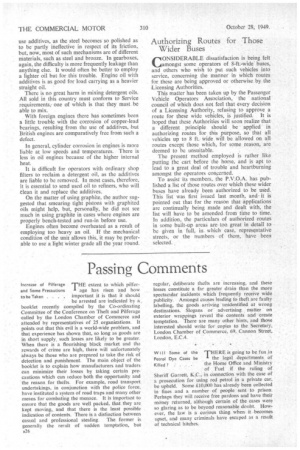Straight or Detergent Oils?
Page 27

Page 28

If you've noticed an error in this article please click here to report it so we can fix it.
many There is Much HERE have been ma ,arguments amongst -r•
I his Subject an
operators and transport engineers as to the need for are We using anti-oxidants and deter gents in oils for modern engines, also as to whether the advantages claimed for these special lubricants are worth their sometimes higher. cost.
Many of the questions raised should be answered by a valuable paper on this subject, read last week before the Institute of Road Transport Engineers, a précis of which will be found elsewhere in this issue.
The author, who has had some 30 years' experience in solving lubrication problems, is obviously greatly in favour of the employment of suitable additives, and he certainly brought forward much evidence tb prove their value. In fact, he considers that only those operators who run their vehicles in what we may term a most gentle manner and under the best conditions, can afford to remain faithful to the older classes of straight mineral oil, although these themselves are superior to those employed ,only a few years ago, for the reason that they are now mostly solvent-refined, the use of acid being obviated_ The difficulty, these days, is that the design of many engines has almost overtaken the practical capabilities of the straight oils, the power developed for the volumetric capacity has risen considerably and, consequently, in many, crank case temperatures are much higher, with the result that oxidation of the oil is far more likely to occur—in fact, with a straight oil the rate of oxidation doubles for each rise in temperature Of 18 degrees F.
Dirty. Engines Benefit Most The development of the oil engine has also resulted in a demand for lubricants of higher quality, possessing characteristics far removed from those of the ordinary varieties. Some oil engines are apt to become extremely dirty internally, partly through oil oxidation and partly 'as a result of the formation of soot when slight maladjustments in the injection equipment prevent conapkte combustion. A clean engine means one that is likely to have a much longer wearing life.
Earlier efforts in connection with additives were mainly designed to slow the process of oxidation and to preserve oil stability at higher. temperatures. Later additives are intended t o disperse carbonaceous and varnish-like deposits, main taining these suspended in the form of fine particles which will float in the oil without causing damage, and he removed on draining.
Extensive tests undertaken by London Transport using oil engines, have shown that with the new oils containing additives cylinder wear is greatly reduced, whilst engine life has been increased by an average of 20,000 miles.
Claims for Additive Oils It seems that practically all those who have tried out these oils experience much less difficulty with internal deposits, particularly on piston walls, and stuck piston rings. Other improvements are longer bearing life, fewer failures of overhead rocker gear, lengthier periods between crankcase drainage, freer oil-circulating systems and cleaner filters requiring less-frequent servicing. An interesting additional benefit is that men working on the engines are much more satisfied and do not require bonuses for dirty work, and special clothing. Cases have occurred where, having experienced the benefit of cleaner, power units, men have refused to work on others.
Apart from what was divulged in the actual paper, much interesting information was deriVed from the discussion which followed it There were many queries, but we refer only to certain of the most instructive answers.
The lecturer pointed out that all filters remove some additives, which may cling to the c*arbon, but the total thus lost is negligible. It is important, however, not to use filters of the Fuller's-earth type, which are employed more in the U.S.A. than here, as they extract a considerable quantity.
Anything added to a straight oil is an additive, but the usual types employed are anti-oxidant and anti-sludging. Sludge in a petrol engine contains -the same materials as in an oil engine, whilst a varnish is probably oxidized oil and fuel which will eventually turn to carbon.
Where synchromesh devices are used in gearboxes of all-steel construction, it is unadvisable to n25 use additives, as the steel becomes so polished as to be partly ineffective in respect of its friction, but, now, most of such mechanisms are of different materials, such as steel and bronze. In gearboxes, again, the difficulty is more frequently leakage than anything else. It would often be better to employ a lighter oil but for this trouble. Engine oil with additives is as good for load carrying as a heavier straight oil. '
There is no great harm in mixing detergent Oils. All sold in this country must conform to Service requirements; one of which is that they must . be able to mix.
With foreign engines there has sometimes been a little trouble with the corrosion of copper-lead bearings, resulting from the use of additives, but British engines are comparatively free from such a defect.
In general, cylinder corrosion in engines is more liable at low speeds and temperatures. There is less in oil engines because of the higher internal heat.
It is difficult for operators with ordinary shop filters to reclaim a detergent oil, as the additives are liable to be removed. In most cases, therefore, it is essential to send used oil to refiners, who will tlean it and replace the additives.
On the matter of using graphite, the author suggested that smearing tight pistons with graphited oils might help, but, personally, he did not see much in using graphite in cases where engines are properly bench-tested and run-in before use.
Engines often become overheated as a result of employing too heavy an oil. If the mechanical condition of the unit allows this, it may be preferable to use a light winter grade all the year round.
Authorizing Routes for Those Wider Buses '
CONSIDERABLE dissatisfaction is being felt amongst some operators of 8-ft-wide buses. and others who wish to put such vehicles into service, concerning the manner in which routes for these are being approved or otherwise by the Licensing Authorities.
This matter has been taken up by the Passenger Vehicle Operators Association, the national council of which does not feel that every decision of a Licensing Authority, refusing to approve a route for these wide vehicles, is justified. It is hoped that these Authorities will soon realize that a different principle should be applied• in authorizing routes for this purpose, so that all vehicles up to 8 ft. wide will be allowed on all routes except those which, for some reason, are deemed to be unsuitable.
The present method employed is rather like putting the cart before the horse, and is apt to lead to a great deal of trouble and heartburning amongst the operators concerned.
To assist its members, the P.V.O.A. has published a list of those routes over which these wider buses have already been authorized to be used. This list was first issued last month, and it is pointed out that for the reason that applications are continually being made and dealt with, the list will have to be amended from time to time. In addition, the particulars of authorized routes in some built-up areas are too great in -detail to be given in full, in which case, representative streets, or the numbers of them, have been selected.




























































































